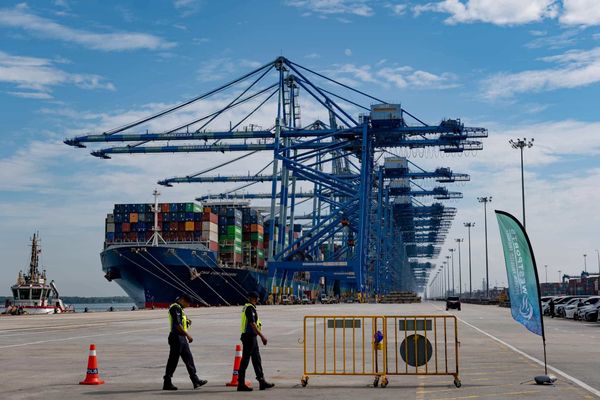By Danial Dzulkifly
SHAH ALAM, May 15 — The recent wave of tariff hikes imposed by the United States (US) and other major economies has sent ripples through global trade, but economists predict that the impact on Malaysia's maritime sector and key logistics hubs like Port Klang will be short-lived.
Economist Geoffrey Williams believes this will be the case as trade volumes are expected to normalise as the year progresses.
“The process has disrupted supply chains, particularly in maritime logistics, as goods move between countries.
“There was a surge in trade ahead of the tariffs due to front-loading, but this will ease as it becomes clear that the tariffs will not be imposed and inventories remain high."
“We will likely see a cycle in maritime logistics this year, but it should normalise by the year-end,” he told Media Selangor.
Front-loading occurs when companies rush to ship goods before potential duties are enforced, resulting in temporary fluctuations in shipping volumes.
Williams is confident that Malaysia’s strategic role in global maritime trade will remain steady despite short-term uncertainties.
The same applies to Selangor’s logistics ecosystem, which he said is unlikely to face significant setbacks.
“Based on current developments, the tariff issue is being resolved quickly. This should not result in a drop in container traffic through Port Klang or cause long-term decline in manufacturing or Selangor’s logistics ecosystem,” Williams said.
The new tariffs imposed by the US, part of broader efforts to address trade imbalances, have had widespread implications, particularly for developing nations like Malaysia.
Universiti Teknologi MARA academic Prof Tan Peck Leong highlighted the strain that the tariffs have placed on market equilibrium, warning that such measures could hinder economic growth, not only in Malaysia, but also in the US.
"While the US aims to fix its trade imbalance, these tariffs are likely to cause short-term disruptions, raising prices for American consumers and creating uncertainty for Malaysian exporters," he said.
[caption id="attachment_396862" align="aligncenter" width="1175"] A drone view shows trucks as they transport cargo at the Bayport Container Terminal in Seabrook, Texas, the United States, on April 7, 2025. — Picture by REUTERS[/caption]
A drone view shows trucks as they transport cargo at the Bayport Container Terminal in Seabrook, Texas, the United States, on April 7, 2025. — Picture by REUTERS[/caption]
Optimism for markets, small impact on SMEs
Despite the uncertainty, both economists remain optimistic that global markets will adjust.
Williams anticipates that ongoing negotiations between the US and over 80 countries, including Malaysia, will lead to the removal or reduction of tariffs, easing trade barriers and creating greater opportunities in the long term.
He also dismissed suggestions that the tariff would benefit Malaysia’s regional competitors like Singapore and Thailand, as they face the same global challenges.
Separately, the economists agree that Malaysia’s small and medium-sized enterprises (SMEs) are not as vulnerable as they appear.
Williams pointed out that SMEs account for only 18 to 20 per cent of Malaysia’s exports, and many specialise in niche products.
“As such, the impact on SMEs will be relatively small. Those focused on the local market will be less affected, while exporters are likely to maintain supply-chain resilience due to strong business-to-business relationships with US buyers,” he said.
For Tan, the ongoing tariff dispute should serve as a wake-up call for Malaysia to upgrade its export structure.
“In the bigger picture, this is Malaysia’s moment to evolve. We must invest in high-tech industries, raise our export standards, and strengthen our global trade position.
“Rather than seeing these tariffs as a setback, they should be a wake-up call to move forward, smarter and stronger,” he said.
[caption id="attachment_400012" align="aligncenter" width="971"] A United States (US) flag flutters near Chinese shipping containers at the Port of Los Angeles, in San Pedro, California, the US, on May 1, 2025. — Picture by REUTERS[/caption]
A United States (US) flag flutters near Chinese shipping containers at the Port of Los Angeles, in San Pedro, California, the US, on May 1, 2025. — Picture by REUTERS[/caption]
Diplomacy and the path forward
As discussions between the US and Malaysia continue, Tan stressed the importance of economic diplomacy in securing a fairer and more balanced trade agreement.
He believes Malaysia has a strong opportunity to present itself as a progressive and responsible trading partner willing to enhance technology and product quality.
“This is why ongoing negotiations with the US are so important. They offer a chance not only to ease tensions but to reshape the trade relationship into something more balanced and resilient. Positive outcomes, like those seen in past US-United Kingdom talks, could pave the way for deeper and fairer economic ties,” Tan said.
Earlier this week, maritime industry analyst Nazery Khalid warned that if the US enforces the high tariffs after the current 90-day pause, large importers may be able to absorb the costs, but smaller firms could face financial ruin, potentially leaving goods stranded at ports.
“Importers with deep pockets will pay the extra tariffs in addition to additional levies, but small companies without sizeable cash or liquidity will not pick up the goods and will leave them stranded at ports.
“This could lead to cargoes being returned to the port of origin by exporters or suppliers. If that fails, the goods may be abandoned at the destination ports, prompting authorities to impose costly detention charges on importers, resulting in cargoes being stuck and eventually piling up at ports,” he said in a recent interview with national news agency Bernama.
Nazery added that Malaysia may benefit if US companies seek alternative manufacturing locations with lower tariffs, although reshoring is not always guaranteed.
Despite these concerns, Port Klang and Tanjung Pelepas Port, both among the top 20 busiest container ports, have managed to avoid severe impacts thus far. Sabah Ports also recorded a positive performance, driven by intra-Asia trade.
[caption id="attachment_235358" align="aligncenter" width="1385"] Westports in Port Klang. — Picture by WESTPORTS[/caption]
Westports in Port Klang. — Picture by WESTPORTS[/caption]




